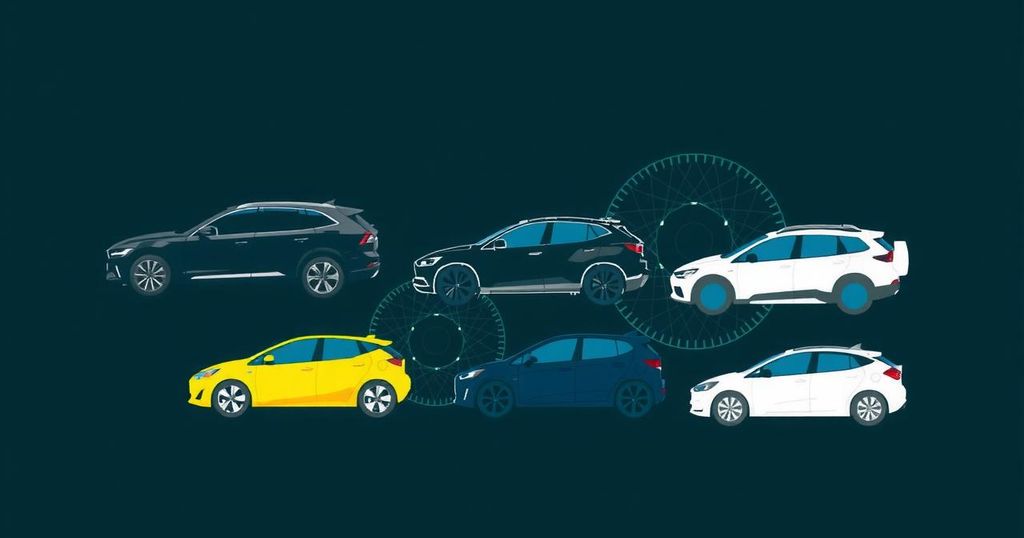Summary
Major global car manufacturers like Ford, Hyundai, and Volvo are revising their electric vehicle (EV) strategies due to declining demand for pure EVs, intense competition from affordable Chinese models, and insufficient government support. Ford has scaled back ambitious production targets and shifted focus to hybrids. Hyundai maintains a goal of significant EV sales but acknowledges the importance of hybrids in its lineup. Volvo and Porsche have similarly adjusted their electrification commitments, indicating that a complete transition to electric may take longer than anticipated.
Recent trends indicate a significant shift in the strategies of major automobile manufacturers regarding electric vehicles (EVs). Prominent companies such as Ford, Hyundai, and Volvo, which previously expressed ambitious goals for producing purely electric line-ups, are now recalibrating their plans in response to various market challenges. The dream of a comprehensive EV portfolio by 2030 now appears increasingly unattainable, as these companies confront factors such as declining demand for pure EVs, heightened competition from lower-priced Chinese alternatives, and a lack of substantial government incentives for the adoption of electric vehicles. Ford, for instance, has revised its initial goal of producing two million EVs annually by 2026. The company has paused plans for a seven-seat SUV and has postponed the launch of a new pickup truck until 2027. CEO Jim Farley acknowledged that the viability of affordable EVs hinges on the cost of batteries, which presents a challenge as Ford currently licenses much of its battery technology from Chinese manufacturers, making it difficult to achieve competitive pricing. Similarly, Hyundai remains committed to a target of two million EV sales by 2030 but plans to double its hybrid offerings by 2028. The automaker has shifted focus toward “extended-range EVs,” which utilize combustion engines to recharge their batteries, recognizing that hybrid vehicles are becoming a necessary complement to traditional internal combustion engines rather than a mere alternative. Volvo initially aspired to be fully electric by 2030 but is now also incorporating hybrids into its lineup. The manufacturer continues to aim for an electric version of most cars but admits the production of its EX90 model has faced delays due to technical challenges. Porsche has similarly adjusted its trajectory regarding electrification, indicating that the transition may take longer than anticipated. The brand intends to sustain its internal combustion engine offerings while gradually increasing electrification across its model range. Other automotive giants like Mercedes-Benz are also postponing their 2030 pure EV commitments in favor of maintaining a combination of combustion and hybrid models for the foreseeable future.
The global automotive industry is undergoing a pivotal transition toward electrification, spurred by environmental concerns, regulatory changes, and consumer demand. However, as predictive forecasts for the widespread adoption of electric vehicles have evolved over the last couple of years, several major automakers are reassessing their previous commitments to transition away from internal combustion engines entirely. Factors such as volatile market conditions, waning consumer demand for pure EVs, and fierce competition from lower-cost alternatives overseas are compelling manufacturers to slow or rethink their electrification strategies. This has led to a renewed emphasis on hybrid vehicles, which combine electric power with traditional combustion engines, thus extending the timeframe for phasing out combustion engines.
The current landscape of the automotive industry reflects a significant shift in electric vehicle strategies among leading manufacturers. As Ford, Hyundai, Volvo, and Porsche revise their ambitious electrification goals, they recognize the necessity of incorporating hybrid models into their lineups to address market demands and competitive pressures. This consolidation of EV plans highlights the complexities and challenges faced as the industry navigates the daunting transition towards a more sustainable future. The evolving strategies suggest that the road to a completely electrified fleet by 2030 may be more complex and prolonged than initially expected, with hybrids emerging as a pivotal component in this journey.
Original Source: www.techradar.com

Leave a Reply